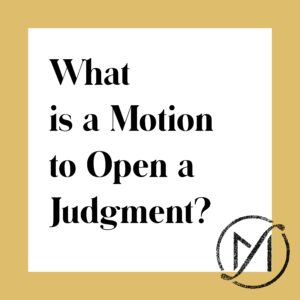Sometimes, following the final judgment in a divorce or another family law matter such as a child custody action, you may consider filing a “Motion to Open or Set Aside Judgment.” A Motion to Open is a Post Judgment motion that allows the court to change a final court decree.
Read on to learn more.
Reopening Divorce Judgments Under 4 Months Old
Generally speaking, Courts don’t like to reopen divorce or family law judgments. Once a judgment enters, all the parties expect that the court’s decision is final and reliable.
To that end, under the court rules, judges do not open or set aside divorce and family law judgments unless a party files the motion to reopen within four months following the date of the judgment. Even within the four months, Connecticut courts have limited the circumstances in which a court may open a judgment to where there is a “good and compelling reason for its modification or vacation” or if the parties mutually waive the requirement.
Reopen a Divorce By Default Judgment
For example, the court entered a default judgment because the defendant didn’t file an appearance. If the defendant filed a Motion to Open the Divorce within four months of the judgment, the defendant would seek to present “good and compelling” evidence for why they didn’t file an appearance and participate in the divorce. For example, perhaps the defendant didn’t have notice of the divorce, or there were other exceptional circumstances.
Read: What’s an Appearance in a Divorce?
Reopening Dissolution Judgments After 4 Months
The only time the court will open a judgment after the 4-month limitation is when the moving party demonstrates that the judgment was obtained by fraud, in the absence of actual consent, or because of mutual mistake.
Motion to Open Based Upon Fraud
Opening cases based on fraud is an actively evolving area of family law in Connecticut, and it is important to have an experienced family law attorney involved.
Generally speaking, for a court to grant a Motion to Open Based Upon Fraud, it must find the following:
- There was no laches or unreasonable delay following the discovery of the fraud by the party bringing the Motion.
- There is clear proof of perjury or fraud.
- There is a reasonable probability that the result of a new trial would be different.
When taken together, these present a high bar. The mere suspicion of fraud, even if reasonable, is not enough. You need some proof. Then, the fraud must rise to a level that the result of a new trial would likely be different. It’s also important to note that the Motion to Open cannot be based upon Post Judgment fraud. The alleged fraud had to occur before the final judgment. In many cases, the Motion to Open Based Upon Fraud addresses a situation where one spouse hid assets during the divorce. We also referred to this as a “fraudulent concealment” claim.
Motion to Open Based Upon Duress
Motions to Open Based Upon Duress tend to be less common than those based upon fraud. Generally, these motions happen in divorces finalized based upon the parties’ agreement — or “stipulation” —. In other words, through mediation, collaborative divorce, or negotiations and settlement discussions in a litigated divorce, the spouses reached an agreement on all the issues in their divorce. Then, they submitted that agreement to the court. After the judge approved it, the stipulated agreement became a final order of the court. To conclude that a stipulated divorce judgment resulted from duress, the court must find that one spouse’s conduct induced the other spouse to execute the agreement, not as an exercise of that spouse’s free will but because that spouse had no reasonable alternative in light of the circumstances as that spouse perceived them to be.
Motion to Open Based Upon Mutual Mistake
Like Motions to Open Based Upon Duress, parties tend to bring Motions to Open Based Upon Mutual Mistake in the context of final judgments they reached via agreement. Mutual mistake exists when both spouses are mutually mistaken about the same fact, creating a result neither party intended.
Motion to Open vs. Appeal
Some people have shared that they need clarification on the difference between a Motion to Open and filing an Appeal. Generally speaking, Motions to Open involve facts, whereas Appeals allege that judge made a legal mistake that should be reversed or reconsidered.
Next Steps
To start making a plan for your Post Judgment issue, reach out. Our first step at Freed Marcroft, the Goals & Planning Conference, is designed to get to the heart of your problem and unveil your actual goals. Then, we analyze those goals, plus the facts of your case, and present you with recommendations and options to move forward.









